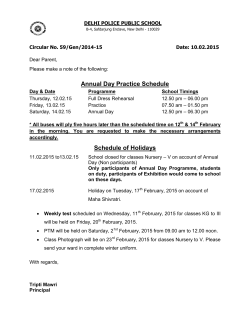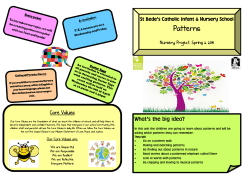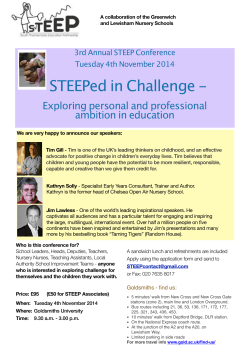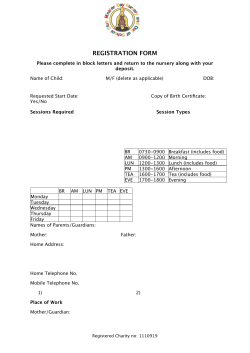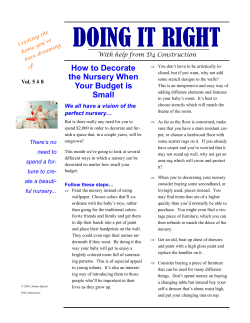
Health and safety policy - First Steps Children`s Nursery
First Steps Children’s Nursery & Forest School Health and Safety Policy Statement of intent First Steps Children’s Nursery believes that the health and safety of children is of paramount importance. We make our setting a safe and healthy place for children, parents, staff and volunteers. Aim We aim to make children, parents and staff aware of health and safety issues and to minimise the hazards and risks to enable the children to thrive in a healthy and safe environment. Methods Each of our nurseries has a named member of staff who is responsible for health and safety. He/she is competent to carry out these responsibilities. He/she has undertaken health and safety training and regularly updates his/her knowledge and understanding. We display the necessary health and safety poster in all staff rooms Risk assessment Our risk assessment process includes: checking for hazards and risks indoors and outside, and in our activities and procedures. Our assessment covers adults and children; deciding which areas need attention; and developing an action plan that specifies the action required the timescales for action, the person responsible for the action and any funding required. We maintain lists of health and safety issues, which are checked: daily before the session begins; weekly. Insurance cover We have public liability insurance and employers' liability insurance. The certificate for public liability insurance is displayed on the parent’s notice board in each nursery. Awareness raising Our induction training for staff and volunteers includes a clear explanation of health and safety issues so that all adults are able to adhere to our policy and understand their shared responsibility for health and safety. The induction training covers matters First Steps Children’s Nursery & Forest School: Health and Safety Policy © First Step’s Children’s Nursery 2015 of employee well-being, including safe lifting and the storage of potentially dangerous substances. Health and safety issues are explained to the parents of new children so that they understand the part played by these issues in the daily life of the setting. As necessary, health and safety training is included in the annual training plans of staff, and health and safety is discussed regularly at staff meetings. We have a no smoking policy. Children are made aware of health and safety issues through discussions, planned activities and routines. Children's safety We ensure all staff employed has been checked for criminal records by an enhanced disclosure from the Criminal Records Bureau. All children are supervised by adults at all times. Whenever children are on or off the premises at least two adults must be present. Security Systems are in place for the safe arrival and departure of children. The times of the children's arrivals and departures are recorded. The arrival and departure times of adults - staff, volunteers and visitors - are recorded. Our systems prevent unauthorised access to our premises. The personal possessions of staff and volunteers can be locked away securely if required although all staff and visitors are reminded that personal possessions are left at owners own risk. Kitchen Children do not have unsupervised access to the kitchen. All surfaces are clean and non-porous. There are separate facilities for hand-washing and for washing up. Cleaning materials and other dangerous materials are stored out of children's reach. When children take part in cooking activities, they: - are supervised at all times; - are kept away from hot surfaces and hot water; and - do not have unsupervised access to electrical equipment. Electrical/gas equipment First Steps Children’s Nursery & Forest School: Health and Safety Policy © First Step’s Children’s Nursery 2015 All electrical/gas equipment conforms to safety requirements and is checked regularly. Our boiler/electrical switchgear/meter cupboard is not accessible to the children. Fires, heaters, electric sockets, wires and leads are properly guarded and the children are taught not to touch them. There are sufficient sockets to prevent overloading. The temperature of hot water is controlled to prevent scalds. Lighting and ventilation is adequate in all areas including storage areas. Storage All resources and materials from which children select are stored safely. All equipment and resources are stored or stacked safely to prevent them accidentally falling or collapsing. Outdoor area Our outdoor area is securely fenced. Our outdoor area is checked for safety and cleared of rubbish daily before it is used. Adults and children are alerted to the dangers of poisonous plants, herbicides and pesticides. Our outdoor sand pit is raked regularly and a cat scare is in place. Daily risk assessments are carried out. All outdoor activities are supervised at all times. Hygiene We regularly seek information from the Environmental Health Department and the Health Authority to ensure that we keep up to date with the latest recommendations. Our daily routines encourage the children to learn about personal hygiene. We have a daily cleaning routine for the setting which includes play room(s), kitchen, rest area, toilets and nappy changing areas. We have a schedule for cleaning resources and equipment, dressing-up clothes and furnishings. The toilet area has a high standard of hygiene including hand washing and drying facilities and the disposal of nappies. We implement good hygiene practices by: - cleaning tables between activities; - checking toilets regularly; First Steps Children’s Nursery & Forest School: Health and Safety Policy © First Step’s Children’s Nursery 2015 - wearing protective clothing - such as aprons and disposable gloves - as appropriate; - providing sets of clean clothes; - providing tissues and wipes; and - ensuring sole use of flannels. Activities Before purchase or loan, equipment and resources are checked to ensure that they are safe for the ages and stages of the children currently attending the setting. The layout of play equipment allows adults and children to move safely and freely between activities. All equipment is regularly checked for cleanliness and safety and any dangerous items are repaired or discarded. All materials - including paint and glue - are non-toxic. Sand is clean and suitable for children's play. Physical play is constantly supervised. Children are taught to handle and store tools safely. Children who are sleeping are checked regularly. Children learn about health, safety and personal hygiene through the activities we provide and the routines we follow. Animals Animals visiting the setting are free from disease and safe to be with children, and do not pose a health risk. Our setting's pets are free from disease, safe to be with children, and do not pose a health risk. Children wash their hands after contact with animals. Outdoor footwear worn to visit farms or Forest School are cleaned of mud and debris and should not be worn indoors. Safety of adults Adults are provided with guidance about the safe storage, movement, lifting and erection of large pieces of equipment. When adults need to reach up to store equipment or to change light bulbs they are provided with safe equipment to do so. First Steps Children’s Nursery & Forest School: Health and Safety Policy © First Step’s Children’s Nursery 2015 Adults do not remain in the building on their own or leave on their own after dark. The sickness of staff and their involvement in accidents is recorded. The records are reviewed every three months to identify any issues that need to be addressed. Food and drink Staff who prepare and handle food receive appropriate training and understand - and comply with - food safety and hygiene regulations. All food and drink is stored appropriately. Adults do not have hot drinks in the play rooms, hot drinks should be consumed in staff areas only. Staff to ensure that all food is of a suitable temperature before it is served to children. Snack and meal times are appropriately supervised and children do not walk about with food and drinks. Fresh drinking water is available to the children at all times. We operate systems to ensure that children do not have access to food/drinks to which they are allergic. Fire safety Fire doors are clearly marked, never obstructed and easily opened from inside. Smoke detectors/alarms and fire fighting appliances conform to BSEN standards, are fitted in appropriate high risk areas of the building and are checked as specified by the manufacturer. Our emergency evacuation procedures are: - clearly displayed in the premises; - explained to new members of staff, volunteers and parents; and - practised regularly at least once every six weeks. Records are kept of fire drills and the servicing of fire safety equipment. Smoking Smoking is not permitted in or around the Nursery building. Staff who wish to leave the premises to have a cigarette can only do so during their lunch break. Any member of staff who returns to work smelling strongly of smoke will be asked to change clothes. The Nursery aims to actively discourage smoking and signs are visible. First Steps Children’s Nursery & Forest School: Health and Safety Policy © First Step’s Children’s Nursery 2015 First aid and medication At least one member of staff with current first aid training is on the premises or on an outing at any one time. Our first aid kit: complies with the Health and Safety (First Aid) Regulations 1981; is regularly checked by a designated member of staff and re-stocked as necessary; is easily accessible to adults is kept out of the reach of children. At the time of admission to the setting, parents' written permission for emergency medical advice or treatment is sought. Parents sign and date their written approval. Parents indicate on our record card/child information sheet at registration allowing staff to take their child to the nearest Accident and Emergency unit to be examined, treated or admitted as necessary on the understanding that parents have been informed and are on their way to the hospital. Administration of medication Only prescribed medication, paracetamol, antihistamine and antiseptic healing creams may be administered. They must be clearly labelled, in-date and, if prescribed must be for the child and for their current condition. If a child develops a temperature or becomes poorly during their time at nursery, a member of staff will contact the parents and request that we give their child some liquid paracetamol (Calpol). If a child’s condition does not improve, parents will be asked to collect their child. Children taking prescribed medication must be well enough to attend the setting. Children's prescribed drugs are stored in their original containers, are clearly labelled and are inaccessible to the children. Parents fill in one of our medicine forms for the administration of medication. This states the name of the child, the name of the prescribed medicine, the illness for which the medication is prescribed, the date the medication starts and finishes, the dose and times and is signed by a parent. The parent must also’ sign in’ for dropping the medicine off and ‘sign out’ for taking it home at the end of the day. The medicine forms, once completed are stored in the office. If we are not satisfied that the medication is in its original form then we will be unable to administer it. For example, if the medicine is out of date, appears to be discoloured or of a different consistency. The administered dose is recorded accurately each time it is given and is signed by two members of staff. If the administration of prescribed medication requires medical knowledge, individual training is provided for the relevant member of staff by a health professional. First Steps Children’s Nursery & Forest School: Health and Safety Policy © First Step’s Children’s Nursery 2015 Sickness Our policy for the exclusion of ill or infectious children is discussed with parents. This includes procedures for contacting parents - or other authorised adults - if a child becomes ill while in the setting. We will contact parents if a child becomes ill but, if it is not possible for a parent/carer to collect their child immediately, we will take responsible measures to care for him/her until they can be collected. We do not provide care for children who have an infectious disease and we ask that children who develop sickness and diarrhoea do not attend nursery for at least 48 hours. Parents are notified if there is an infectious disease, such as chicken pox. Parents are notified if there is a case of head lice in the setting. Children with head lice are not excluded, but must be treated to remedy the condition. We follow the guidelines published by the Health Protection Agency in regard to any infectious disease or illness. Children or families are not excluded because of HIV. Good hygiene practice concerning the clearing of any spilled bodily fluids is carried out at all times. Staff suffering from sickness and diarrhoea do not handle food. Ofsted is notified of any infectious diseases that a qualified medical person considers notifiable. Recording accidents: Accident forms are kept safely and accessibly; All staff and volunteers know where they are kept and how to complete them Our accident procedures are reviewed at six monthly intervals in order to identify any potential or actual hazards. We will notify Ofsted of any serious accident, illness or injury to, or death of, any child, in our care within 14days of the incident occurring. Dealing with incidents We meet our legal requirements for the safety of our employees by complying with RIDDOR (the Reporting of Injury, Disease and Dangerous Occurrences Regulations). We report to the Health and Safety Executive: any accident to a member of staff requiring treatment by a general practitioner or hospital; and any dangerous occurrences. This may be an event that causes injury or fatalities or an event that does not cause an accident but could have done, such as a gas leak. First Steps Children’s Nursery & Forest School: Health and Safety Policy © First Step’s Children’s Nursery 2015 Any dangerous occurrence is recorded on our Incident Form. See below. Incident Book and Emergency Procedures We keep ‘incident forms’ for recording incidents including those that that are reportable to the Health and Safety Executive as above. These incidents include: - break in, burglary, theft of personal or the setting's property; - fire, flood, gas leak or electrical failure; - attack on member of staff or parent on the premises or near by; - any racist incident involving a staff or family on the centre's premises; - death of a child, and - a terrorist attack, or threat of one. On the incident forms we record the date and time of the incident, nature of the event, who was affected, what was done about it - or if it was reported to the police, and if so a crime number. Any follow up, or insurance claim made, should also be recorded. These must be signed by the Manager. In the unlikely even of a terrorist attack we follow the advice of the emergency services with regard to evacuation, medical aid and contacting children's families. Our standard Fire Safety Policy will be followed and staff will take charge of their key children. The incident is recorded when the threat is averted. In the unlikely even of a child dying on the premises, for example, through cot death in the case of a baby, or any other means involving an older child, the emergency services are called, and the advice of these services are followed. Birmingham: o Local Authority Designated Officer (LADO) 0121 303 4806 o Local safeguarding Duty Assessment Team 0121 303 1888 Wolverhampton o Local Authority Designated Officer (LADO) 01902 550477 o Local safeguarding Duty Assessment Team 01902 555392 Ofsted (03001231231) Outings and visits We have agreed procedures for the safe conduct of outings. Parents sign a general consent on registration for their children to be taken out as a part of the daily activities of the setting. Parents always sign consent forms before major outings. First Steps Children’s Nursery & Forest School: Health and Safety Policy © First Step’s Children’s Nursery 2015 A risk assessment is carried out before an outing takes place. This takes into consideration where the outing is to, mode of transport and staff/children. Our adult to child ratio is high. Named children are assigned to individual staff to ensure each child is individually supervised and to ensure no child gets lost and that there is no unauthorised access to children. Staff take a mobile phone on outings, and supplies of tissues, wipes, pants etc as well as a mini first aid pack, a snack and water. The amount of equipment will vary and be consistent with the venue and the number of children as well as how long they will be out for. Records are kept of the vehicles used to transport children, with named drivers and appropriate insurance cover. A minimum of two staff should accompany children on outings and a minimum of two should remain behind with the rest of the children. Missing child If a child goes missing from the nursery The person in charge will carry out a thorough search of the building and garden. The register is checked to make sure no other child has also gone astray. Doors and gates are checked to see if there has been a breach of security whereby a child could wander out. Person in charge talks to staff to establish what happened If the child is not found the parent is contacted and the missing child is reported to the police. If a child goes missing from an outing where parents are not attending and responsible for their own child, we ensure that there is a procedure that is followed. As soon as it is noticed that a child is missing, staff on the outing ask children to stand with their designated person and carry out a headcount to ensure that no other child has gone astray. One staff searches the immediate vicinity but does not search beyond that. The person in charge is informed, if s/he is not on the outing and makes his/her way to the venue to aid the search and be the point of contact for the police as well as support staff. Staff take the remaining children back to the setting. The person in charge of the setting contacts the child's parent who makes their way to the setting or outing venue as agreed with the person in charge. The staff contact the police using the mobile phone and report the child as missing. First Steps Children’s Nursery & Forest School: Health and Safety Policy © First Step’s Children’s Nursery 2015 In an indoor venue, the staff contact the venue's security who will handle the search and contact the police if the child is not found. The person in charge of the outing contacts the manager/proprietor who will come down to the setting or venue as soon as possible. Once it has been established that a child has gone missing from either the nursery or an outside venue: The manager/proprietor will carry out a full investigation taking written statements from all the staff present at the time, or who were in the child’s group or on the outing. The key person/ staff writes an incident report detailing: - the date and time of the report; - what staff/ children were in the group/outing; - when the child was last seen in the group/outing; - what has taken place in the group/outing since then; and - the time it is estimated that the child went missing. A conclusion is drawn as to how the breach of security happened. If the incident warrants a police investigation all staff co-operate fully. In this case, the police will handle all aspects of the investigation, including interviewing staff. Social Services may be involved if it seems likely that there is a child protection issue to address. The incident is reported under RIDDOR arrangements and is recorded in the incident book; the local authority health and safety officer may want to investigate and will decide if there is a case for prosecution. OFSTED is informed. Records In accordance with the Welfare Requirements within EYFS, we keep records of: Adults names and addresses of all staff on the premises, including temporary staff who work with the children or who have substantial access to them; All records relating to the staff's employment with the setting, including application forms, references, and results of checks undertaken etc. Children names, addresses and telephone numbers of parents and adults authorised to collect children from setting; the names, addresses and telephone numbers of emergency contacts in case of children's illness or accident; First Steps Children’s Nursery & Forest School: Health and Safety Policy © First Step’s Children’s Nursery 2015 the allergies, dietary requirements and illnesses of individual children; the times of attendance of children, staff, volunteers and visitors; accidents and medicine administration records; consents for outings, administration of medication, emergency treatment; and incidents. In addition, the following procedures and documentation in relation to health and safety and the national welfare requirements are in place: Risk assessments. Record of visitors. Fire safety procedures. Fire safety records. Operational procedures for outings. Vehicle records including insurance. Administration of medication. Prior parental consent to administer medicine. Record of the administration of medicines. Prior parental consent for emergency treatment. Accident records. No smoking. First Steps Children’s Nursery & Forest School: Health and Safety Policy © First Step’s Children’s Nursery 2015
© Copyright 2025

